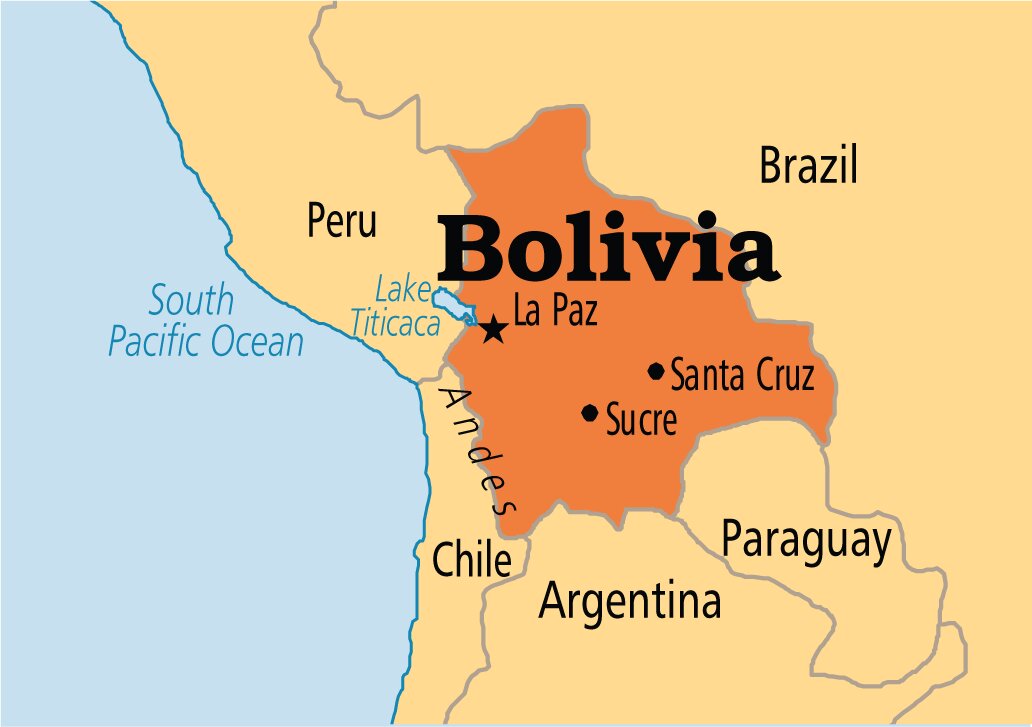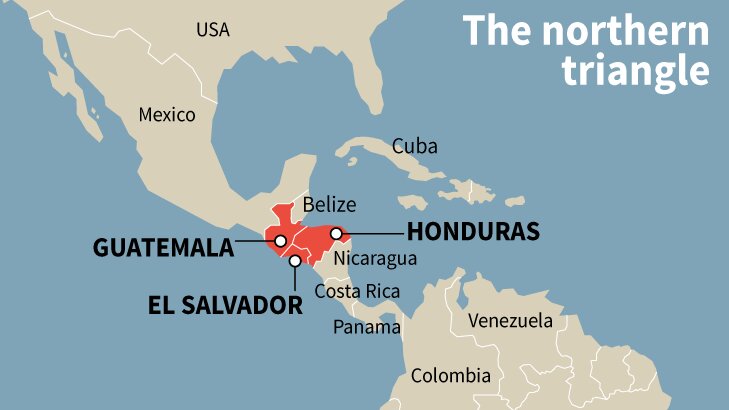International Relations
President's Visit to Bolivia
Recently, President of India completed his visit to the Plurinational State of Bolivia.
- This was the first ever visit by an Indian president to Bolivia.
- Bolivia also conferred the highest State Honour of Bolivia on President of India.
The Plurinational State of Bolivia
- Bolivia is officially known as the Plurinational State of Bolivia.
- It is a landlocked country located in western-central South America.
- The capital of Bolivia is Sucre while the seat of government and financial center is located in La Paz.
- In 2009, a new constitution changed the country's official name to "Plurinational State of Bolivia" in recognition of the multi-ethnic nature of the country
Outcome of Visit
- 8 memorandum of understandings (MoUs) were signed between India and Bolivia concerning fields of culture, visa waiver for diplomats, the exchange between diplomatic academies, mining, space, traditional medicine, the establishment of Centre of Excellence in IT and the Bi-Oceanic Railway project.
- Bolivia also joined the International Solar Alliance by signing the framework agreement.
- Lithium Deposit Exploration
- Both sides also agreed to work together for exploration and extraction of the vast Lithium deposits of Bolivia.
- Lithium is a key resource used in making batteries that India needs for its clean technology initiatives such as increased use of electric cars. It will be a boost to India’s FAME II scheme.
- India agreed to facilitate Bolivian supplies of lithium Carbonate to India and foster joint ventures for Lithium battery/cell production plants in India.
- Financial Aid
- Under the framework of South-South Cooperation, India gave a US$ 100 million Line of Credit to Bolivia for financing development projects in sectors that Bolivia may choose.
India-Bolivia Relations
- The Indian Embassy in Peru is concurrently accredited to Bolivia since April 1981.
- Bolivia opened a resident Mission in India in 2012.
- Trade Relations
- India-Bolivia bilateral trade has grown in the last two years and it stood at US$ 875 million in 2018.
- 60% of Bolivian gold is exported to India.
- Bolivia is the 8th leading trading partner of India in the Latin America region.
- There is a scope for diversifying trade basket to further strengthen the bilateral trade.
Biodiversity & Environment
SC Suspended EC For Airport In Goa
- The Supreme Court (SC) has suspended the Environmental Clearance (EC) granted for the development of Greenfield International Airport at Mopa in Goa.
Reasons Cited
- Procedural Flaws in the grant of EC
- People living in the proposed project-area being not consulted properly.
- Non- disclosure of vital information in the application form for clearance and in Environment Impact Assessment (EIA) Report as well.
- Expert Appraisal Committee (EAC) did not analyze the EIA report properly before approving the EC.
- National Green Tribunal (NGT) did not carry out the merit review of appeal made against the EC given to the Mopa Airport.
Highlights from the Judgement
- A phrase ‘Environmental Rule of Law’ was coined by SC. The court said that every branch of governance and institutions across the country should strive to enforce environmental rule of law.
- Proper structures for environmental decision making find expression in the guarantee against arbitrary action and the affirmative duty of fair treatment under Article 14 (Right to Equality) of the Constitution.
- In cases concerning environmental governance, it is the duty of courts to assess the case on its merits based on the materials present before it.
- Matters concerning environmental governance concern not just the living, but generations to come.
- The health of the environment is key to preserving the Right to Life as a constitutionally recognized value under Article 21 (Protection of Life and Personal Liberty) of the Constitution.
Environmental Rule of Law
- The environmental rule of law is based on four pillars of sustainable development— economic, social, environmental and peace.
- It imbues environmental objectives with the essentials of the rule of law and underpins the reform of environmental law and governance.
- While the most direct effects are on the protection of the environment, it also strengthens rule of law more broadly, supports sustainable, economic and social development, protects public health, contributes to peace and security by avoiding and defusing conflict and protects human and constitutional rights.
Environment Clearance (EC) Process
- An EIA report is prepared to get Environment Clearance (EC) for a project.
- A process of ‘Public Hearing’ is conducted before the issue of ‘Consent to Establish (NOC)’ by state regulators. Concerns of people living in the proposed project area are heard.
- An application form with EIA report, details of public hearing and NOC is submitted for environmental clearance with the Ministry of Environment and Forests (MoEF) if the project falls under Project A category or the state government if the project falls under Project B category.
- The documents submitted are then analyzed by an Expert Appraisal Committee (EAC) under the Ministry. The recommendations of the Committee gets processed in the Ministry of Environment and Forests for final approval or rejection.
Environment Impact Assessment (EIA)
- It can be defined as the study for predicting the effect of a proposed activity/project on the environment.
- It is statutory under the Environment Protection Act, 1986 for some projects.
- Process
- Screening based upon scales of investment, type of development and location of development; is done to see whether a project requires an environmental clearance as per the statutory notifications.
- Scoping is a process of detailing the Terms of Reference (ToR) of EIA, that is the main issues or problems in the development of a project.
- Impact Prediction involves mapping the environmental consequences of the significant aspects of the project and its alternatives.
- Public mandatorily needs to be informed and consulted on the proposed development after the completion of
EIA report.
Important Facts For Prelims
Important Facts For Prelims (1st April 2019)
Earth Hour
- Recently the Earth Hour 2019 was observed on March 30 from 8:30 pm to 9:30 pm local time with the theme #Connect2Earth.
- World Wide Fund for Nature’s (WWF) Earth Hour is an annual global celebration in which people switch off their lights for one hour to show they care about the future of our planet.
- It began in Sydney, Australia in 2007, the number of countries taking part in Earth Hour has grown to over 180 countries and territories.
- Earth Hour is not about how much energy is saved during the hour. Rather, it is a chance to put the spotlight on the issues facing the planet, and to inspire millions across the world to live more sustainably.
World Wildlife Fund
- The World Wide Fund for Nature (WWF) is an international non-governmental organization founded in 1961, working in the field of wilderness preservation, and the reduction of humanity's footprint on the environment.
- It was formerly named the World Wildlife Fund, which remains its official name in Canada and the United States.
- Headquarters: Gland, Switzerland.
- The group's mission is "to stop the degradation of the planet’s natural environment and to build a future in which humans live in harmony with nature".
Earth Day
- Earth Day is an annual event, celebrated on April 22. Worldwide events are held to demonstrate support for environmental protection. It was first celebrated in 1970, and is now coordinated globally by the Earth Day Network (EDN) and celebrated in more than 193 countries each year.
- Earth Day Network is a nonprofit organization whose mission is to diversify, educate and activate the environmental movement worldwide.
- EDN main office is located in Washington DC, USA.
Kolam Tribe
- The Kolam tribe (or in their own language, Kolavar) is a scheduled tribe of Maharashtra. They also live in Andhra Pradesh, Chhattisgarh, and Madhya Pradesh.
- They have a language of their own (Kolami) which belongs, like Gondi, to the intermediate group of Dravidian languages.
- They are monogamous and Hinduism is their religion.
- Recently in 2018, the Government has identified
Katkaria (Kathodia), Kolam and Maria Gond as Particularly Vulnerable Tribal Groups (PVTGs) in the State of Maharashtra.- The Ministry of Tribal Affairs is administering the scheme “Development of PVTGs” for
overall development of PVTGs. This scheme is flexible and enables the States to focus on areas that they consider is relevant to PVTGs and their socio-cultural environment.
- The Ministry of Tribal Affairs is administering the scheme “Development of PVTGs” for
Arbitrage Funds
- Arbitrage funds are a type of mutual fund that
are ideal for investors who want to profit from volatile markets without taking on too much risk. - The arbitrage fund earns profits through the purchase and sale of securities on different exchanges.
- An arbitrage fund buys the stock in the cash market and sells the interest in the futures market, simultaneously.
- While, in the regular equity trade, the stocks are purchased when the prices fall and are sold in the future when prices rise.
Statement of Guiding Principles
- India and the United States signed the amendments to the Statement of Guiding Principles (SGP) on Triangular Cooperation for Global Development.
- The SGP Agreement was signed in November 2014.
- It provides a framework for promoting cooperation between the two countries to meet the developmental aspirations of partner countries, particularly in Asia and Africa.
- The First Amendment to the SGP Agreement extends the validity of the SGP Agreement up-to 2021.
- Under the Agreement, India and U.S. will continue to offer capacity building assistance to partner countries in multiple sectors, focusing primarily on agriculture, regional connectivity, trade and investments, nutrition, health, clean and renewable energy, women empowerment, disaster preparedness, water, sanitation, education and institution building.
Northern Triangle
- The U.S. government has decided to cut aid to the countries of “Northern Triangle”.
- The US has blamed the Central American countries for sending migrants to the United States and threatened to shut the U.S.-Mexico border.
Northern Triangle
- The countries of El Salvador, Guatemala
and Honduras are known asNorthern Triangle. - These countries share a border tripoint at Trifinio biosphere reserve, and also aspects of classical cultures, history, society, and politics.
Phayeng Village
- Phayeng, a small village in Imphal West district of, Manipur has developed itself as India’s first carbon-positive settlement.
- A village is given the carbon-positive tag if it sequesters more carbon than it emits, slowing the accumulation of greenhouse gases and mitigating the effects of climate change.
- The transformation of the village from the dry and denuded village in the 1970s and 80s was funded under the National Adaptation Fund for Climate Change (NAFCC).
National Adaptation Fund for Climate Change (NAFCC)
- The National Adaptation Fund for Climate Change (NAFCC) is a Central Sector Scheme which was set up in the year 2015-16.
- The overall aim of NAFCC is to support concrete adaptation activities which mitigate the adverse effects of climate change.
- The activities under this scheme are implemented in a project mode.
- The projects related to adaptation in sectors such as agriculture, animal husbandry, water, forestry, tourism, etc. are eligible for funding under NAFCC.
- National Bank for Agriculture and Rural Development (NABARD) is the National Implementing Entity (NIE).
Ahmad Sar Lake
- Several parts of Gujarat are facing severe water scarcity in the initial days of the summer season.
- Ahmad Sar Lake at Sarkhej Roza (Ahmedabad) has got dried.
- Sarkhej Roza is a 15th-century complex comprising a mosque and a tomb of Saint Ahmed Khattu Baksh.
- Saint Ahmed Khattu Baksh was the spiritual advisor of the ruling dynasty of Gujarat during the 14th and early 15th centuries.





